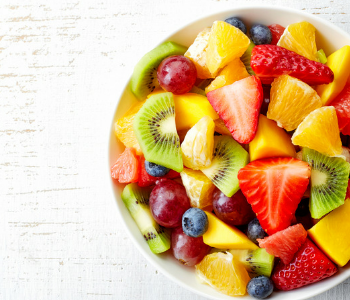NECESSARY NUTRIENTS
As a doctor I know the importance of nutrients for the skin. However, when there are experts in specific fields who can provide more in-depth information, I’d rather you get it straight from them. My expert friends are going to give you gyan on nutrition and some fantastic anti-ageing recipes. However, I want to tell you from a doctor’s perspective that there area few things you must do.
Nutrients for Skin and Hair
As I have already said in the earlier chapters, what you put in your mouth shows on your skin and hair. So here’s a list of diet essentials that you have to ensure gets on your plate every day.
Macronutrients
These are the three food essentials—proteins, carbohydrates, and fats—that our body needs in large quantities to stay healthy. They support the cell structure of our body.
PROTEINS: Proteins are fundamental components of all living cells and include many substances such as enzymes, hormones, and antibodies that are necessary for the proper functioning of an organism. Protein is the key element in our skin and hair make up. They are essential in the diet of animals for the growth and repair of tissues. Your body converts standard proteins that you eat into keratin protein to make up your hair, skin, and nails. Ensuring that you include one source of protein in every meal of your day will help hair growth. That said, the amount of protein required depends on the age and ideal body weight of an individual.
Best food sources: Eggs, lean cuts of chicken, oily fish, lentils, soy or tofu, and spirulina.
CARBOHYDRATES: Despite varying reports about carbohydrates, it is an essential part of your diet. Carbo- hydrates are a group of organic compounds that include sugar, starch, cellulos, and gum and they serve as a ma- jor energy source for us. Carbohydrates sourced from plants give you fibre that regulate your cholesterol and blood sugar. Fibre also helps in eliminating toxins from our body and in better absorption of the nutrients. How- ever, you have to make sure you get your carbohydrates from plant sources and whole grains, and avoid ‘white’ or ‘refined’ carbohydrates.
Best food sources: Whole grains, unpolished dals, oats, brown rice, beans like rajma, carrots, spinach etc.
FATS: Among the macronutrients, fat is essential for supple skin texture and glow. The micronutrients that are essential for skin protection require fat as a medium for absorption. Essential Fatty Acids (EFA) is another nutrient that cannot be made by our body and is required to be consumed through our diet. EFAs are responsible for skin repair, moisture content, and overall flexibility. Dry, inflamed skin or skin that suffers from the frequent appearance of whiteheads or blackheads can benefit from supplementing with EFAs. EFAs are essential to grow hair. About 3% of the hair shaft is made up of these fatty acids. There are two types of EFAs—Omega-3 and Omega-6—that we need to keep our skin and hair healthy.
Omega-6 fatty acids promote hair growth and support skin cell renewal, while Omega-3 fatty acids moisturize your skin and hair follicles for long, radiant hair and a smooth complexion. Omega-3s are also found in cell membranes in the skin of your scalp, and in the natural oils that keep your scalp and hair hydrated. Chances are that you already consume enough Omega-6 fatty acids, so focus on increasing your Omega-3 fatty acid intake. For healthy adults, a combined daily total of 500 milligrams (mg) EPA + DHA is recommended either from diet (i.e. oily fish) or supplements. While having fish for dinner is one way to get EPA and DHA, most people don’t eat the suggested two to three servings of oily fish per week to reap the benefits of these powerful nutrients.
Best food sources: Walnuts, flax seeds, chia seeds, peanut butter, fatty fish like salmon, cod liver oil supplements, and primrose oil supplements.
Easy sources of EFA
Ghee: Among the fats used in our diet, ghee is rich in antioxidants and acts as an aid in the absorption of vitamins and minerals from other foods, serving to strengthen the immune system and prevent skin damage.
Fish oil supplements: You can have these to get your daily requirement of Omega-3s. When you are out shopping for them, be sure to determine how much Omega-3s are provided per serving. The average 1000 mg fish oil softgel typically provides around 300 mg of Omega-3s (even less of the important EPA and DHA), so in order to meet the 500 mg intake guidelines, a minimum of two softgels would be necessary.
Micronutrients
They are essential elements that our body needs to function and regenerate effectively. The main function of micronutrients is to enable many chemical reactions to occur in our body which lead to growth and repair of skin and hair cells. However they are needed in small amounts.
> ANTIOXIDANTS: Vitamin A, C, and E are essential mi- cronutrients that prevent any free radical damage to the skin. They are very powerful antioxidants which ensure the skin cells are safe from harm caused by oxidation.
> VITAMIN A: Stimulates cell turnover. It also helps to produce healthy sebum.
Best food sources: Sweet potato, carrot, spinach, peaches, and cod liver oil.
Recommended daily intake: One medium-sized carrot with 1 bowl of salad with greens everyday should give you the required amount of vitamin A
> VITAMIN C: Vitamin C helps you grow strong skin, hair, and nails, and fight sun damage.
Best food sources: Blueberries, gooseberries, strawber- ries, and oranges.
Recommended daily intake: A cup each of blueberries and strawberries can help you get your required amount of vitamin C.
> VITAMIN E: Adds moisture to your cells, and makes skin and hair shine with health. It all works to stabilize the cell membranes. This vitamin also works with the mineral selenium to ward off attacks on the cells in your follicles.
Best food sources: Sunflower seeds, almonds, papaya, bell peppers.
Recommended daily intake: A quarter cup of sunflower seeds along with 20 almonds in a day can make up for the required amount of vitamin E. Recommended daily intake is 15mg per day.
> VITAMIN B6: Several small-scale clinical studies have shown positive results with vitamin B6 as a hair growth agent. Vitamin B6 does a number of things in the body that aids the overall health of the hair, ranging from boosting the immune system to aiding in the formation of red blood cells.
Best food sources: Tuna fish, lean cuts of poultry, potatoes, sunflower seeds, and bananas.
Recommended daily intake: 1.3 mg/day for adults.
> VITAMIN B12: In regards to human hair, the hair follicles require vitamin B12 in order to properly replicate and if they are not able to, they cannot grow hair effectively. The follicles also require oxygen just like the rest of your body and if there is a shortage of B12, it prevents red blood cells from being properly made in the bone marrow, and the follicles don’t receive proper nutrients resulting in hair loss and a slowing down of hair growth. Vegetarians and specifically vegans will require vitamin B12 supplementation.
Best food sources: Oily fish, lean cuts of meat, yogurt.
Recommended daily intake: 2-3ug/day for adults.
> BIOTIN: Biotin is a vitamin that is needed by our body for the metabolism of various nutrients and the establishment of a number of hormones and enzymes. This substance is needed to support a number of biochemical reactions, including the formation of antibodies. Biotin plays a role in the formation of hormones and enzymes in the body. This vitamin is required for the metabolism of carbohydrates, fats, and proteins and it is very important for hair’s maintenance and prevention of hair loss.
Best food sources: Eggs, Swiss chard, liver, almonds, and walnuts.
Recommended daily intake: 35-70 ug per day.
Essential minerals
They are needed by the body to strengthen the skin and hair cells and improve metabolism.
> IRON: Iron is especially important; because it helps cells carry oxygen to your skin and hair structure. If there is too little iron (anaemia) women particularly experience hair loss and sallow skin. The body does not absorb the kind of iron generally found in some vegetables and grains as efficiently as it does in case of animal sources of iron. Thus, vegetarians need to increase these allowances by 1.8 times.
Best food sources: Spinach, soy beans, tofu, liver, meat, and eggs
Recommended daily intake: For adults, the dosage is 8mg per day. Recommended daily intake for women will vary and depends on their menopausal or pregnancy status. The maximum intake limit from all sources is 45 mg per day.
> ZINC: It is important for normal cell growth. Zinc deficiency weakens the cells, which can result in lesions on the skin. This nutrient also controls the oil production and reduces chances of ageing. Recommended daily intake for adult men is 11mg per day and for adult women it is 8mg per day.
Best food sources: Oysters, pumpkin seeds, sesame seeds, and oats.
Recommended daily intake: 1-2 ounces of oysters can make up for 100% of the daily requirement; vegetarians necessarily may need an oral supplement along with 1⁄4 cup of pumpkin and sesame seeds.
> SELENIUM: This nutrient is essential to maintain skin elasticity. One of the most important functions of selenium is as a component of glutathione peroxidase, an enzyme necessary for the antioxidant function of glutathione. Glutathione is one of the major antioxidants in the body that protects against cellular damage from the free radicals that cause inflammation, ageing, and skin cancer. In fact, many scientists support the theory that selenium in the diet protects against skin cancer. Selenium also plays a significant role in acne severity.
Best food sources: Brazil nuts, shellfish, wheat bran.
Recommended daily intake: Just two Brazil nuts a day will give you the 200 micrograms necessary for an adequate intake.
> FOLIC ACID: Folic acid plays an important role in repair of damaged hair and in healthy hair growth.
Best food sources: Nuts, soybean, or soymilk.
Recommended daily intake: 400–1000ug/day for adults.
> COPPER: Copper is essential for the proper functioning of the body, including healthy hair growth. An inadequate intake of copper can cause hair loss and thinning hair. Copper is also believed to intensify hair colour and delay greying of hair.
Best food sources: Cocoa powder, dark chocolate, cremini mushrooms, black sesame seeds, and lobster.
Recommended daily intake: 2mg per day.
Some of the supplements that you can take on a daily basis to improve your total health and skin and hair are antioxidant pills, a good multivitamin, a fish oil capsule to get your dose of Omega-3, evening primrose oil, vitamin E, and calcium. After a week, if levels are low then add iron and vitamins D3 and B12 as well.
Don’t shy away from supplements because even if you follow a healthy diet, the quantity may not be enough for the necessary amount of essential minerals you may need in a day. A great diet plus some supplements are your secret to good skin and hair.
Leave a Reply
Want to join the discussion?Feel free to contribute!













Some really howling work on behalf of the owner of this web site, perfectly great written content.